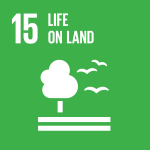One Comorian, One Tree

The Government of Comoros and UNDP launch an ambitious tree-planting initiative with support from the GCF and GEF
9 February 2022, Moroni, Comoros – The Government of Comoros launched a broad reforestation campaign this year to protect watersheds and accelerate the ambition of the country’s Nationally Determined Contribution to the Paris Agreement.
The “One Comorian, One Tree” campaign is supported by the United Nations Development Programme (UNDP) through projects on resilience to climate change funded by the Green Climate Fund (GCF) and Global Environment Facility (GEF).
Honoring commitments announced during last year’s climate talks in Glasgow, Comoros President H.E. Azali Assoumani launched the ambitious countrywide reforestation campaign in Ndzouani, Ngazidja and Moheli.
Understanding the challenge
The effects of climate change threaten to derail recent development gains in Comoros – where approximately 80 percent of the rural population is reliant on rain-fed agriculture. United Nations models indicate a potential reduction in dry-season rainfall of up to 47 percent by 2090 in the Small Island Developing State, increased rains in the wet season, and more severe cyclones hitting the country.
Access to surface water on three of the islands of Comoros is a challenge. The main island of Grande Comore (Ngazidja) has no surface water, requiring coastal towns to exploit marginal groundwater resources. The rural upland communities, making up 50 percent of the island’s population, rely solely on rainwater harvesting.
The reforestation efforts will improve access to water, protect vulnerable and depleted ecosystems, and generate a critical public good that will benefit the people of Comoros for years to come.
“There are multiple environmental and socio-economic benefits to tree planting for the well-being of the Comorian people. That is why UNDP and partners such as the GCF and GEF strongly support this government and community initiative. Political leadership is essential to making meaningful progress; I have been honored over the last month to accompany HE President Azali Assoumani to launch the national reforestation campaign across the country - putting COP26 presidential commitments into action,” said UNDP Representative Fenella Frost.
The national reforestation campaign was launched on January 16 in the Mont Tringui National Park on Ndzouani island. The campaign will run through 2025.
Ndzouani Island, once known for its surface water potential and agricultural dynamism, has lost more than half of its rivers a result of severe resource depletion. In the 1980s, there were about 50 permanent rivers here, while today, the number has dwindled to just 10. Erratic rainfall has further affected watersheds capacity on the island.
A nationwide effort
The campaign looks to plant 613,000 new trees on 571 hectares of land throughout the country. In Ndzouani 250,000 new trees will be planted on 167 hectares, in Ngazidja, 347,000 will be planted on 300 hectares, and on Mwali, 16,000 will be planted across 40 hectares. Taken together with other actions promoting climate resilience, the reforestation campaign offers a durable ecosystem-based approach that will contribute to positive environmental benefits in favor of local communities that are vulnerable to crisis caused by climate change.
One week after the Ndzouani event, President Assoumani launched the “Urban reforestation” initiative in the capital town of Moroni with a focus on planting endemic species.
The final country launch took place in Fomboni, Mwali on January 29. Heavy rains and deforestation have caused irreversible environmental and housing damage in the vicinity of the Msoutrouni River where the campaign launch took place.
Moheli Island governor, Mohammed Said Fazul, emphasized the need to continuously plant trees and take care of them regardless of the fact that Moheli is known for its extensive forest cover .
“Last year, we received the UNESCO certificate for the classification of Mwali as worldwide biosphere reserve. This is a recognition for the island’s exceptional marine and terrestrial biodiversity. It comes with the communities’ and the government’s efforts to protect and restore biodiversity,” said Fazul.
Engaging youth
Young people from neighboring areas in Ndzouani, Ngazidja and Mwali joined the high-level official representatives from the Government and UNDP in the tree planting event in Ndzouani showing their desire to be fully included in the preservation and regeneration of natural resources for their future.
“We were very happy to be part of this event. I am very proud to say that I have planted a tree because I now know that it is important to have more trees in my region. I have understood that trees are not only beautiful but that they can also help us have more water, and that we will benefit from it in the future,” said 11-year-old Youssouf Ali from Vouani.
Vast potential
The chief of Sima Boini village in the south of Ngazidja island stressed the medical potential of some of the plants.
“In Comoros, the tree known as mvoudze (Phyllarthron comorense), which is an endemic evergreen tree, was known for lowering cholesterol in the blood. It is used in traditional medicine and has always been know in Comoros as an effective treatment for many diseases. It is a pity that the young generations no longer know or use it,” he said.
Andaliyat Mohammed is a curator and plant biology expert at the Comoros National Herbarium.
“Green spaces in cities not only help mitigate the effects of air pollution through the reduction of photochemical ozone formation and CO2, they also reduce the urban heat effect (heat trapped in built-up areas) and contribute to reducing energy demand for air cooling by providing shade and evapotranspiration. Culturally, planting trees provide value for the enjoyment of the general public and allow them to rediscover endogenous species formerly spread on the coast of the capital town,” said Mohammed.



